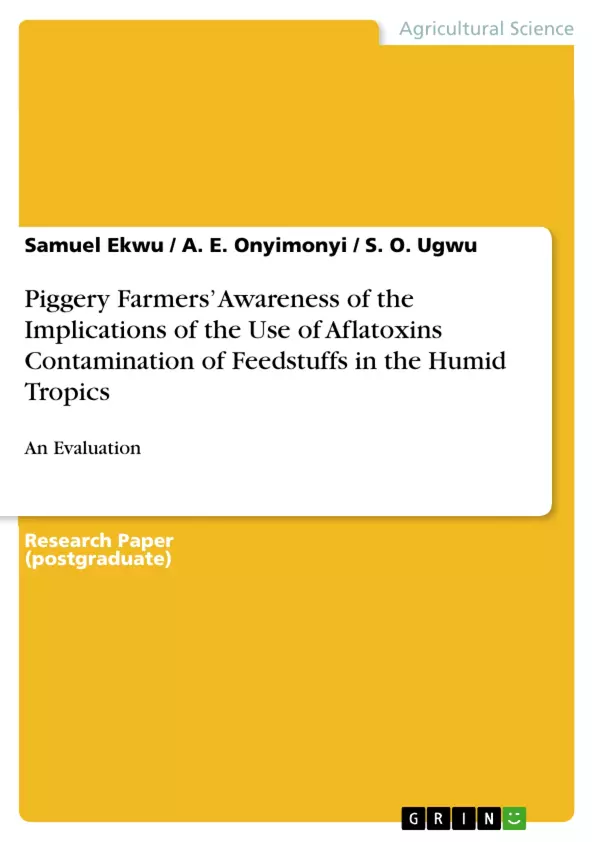This study was conducted to evaluate piggery farmers’awareness of aflatoxins contamination of feedstuffs and its implications in pig production in Nsukka zone. A survey research was conducted using a structured questionnaire which was validated by an agricultural measurement and evaluation experts.
The questionnaire was used to collect data from the piggery farmers. The data collected were analyzed using descriptive statistics option ofGenstat computer package (Discovery edition 3). The result of this study revealed that piggery farmers are aware of aflatoxins infestation, but know little about its economic and health implications on pig production and pork consumers. They also indicated that they are adopting various local and technical methods such as avoiding damp environment, sprinkling ashes and saw-dusts on top of the feedstuffs, in order to reduce the incidence of aflatoxins development in the feedstuffs they use to feed their pig stocks.
They stated that they were not aware that feeding pigs with aflatoxins contaminated food reminants and feeds poses a serious health risk to both the pigs and pork consumers, as they are interested in minimizing the cost of production rather than the welfare of the pigs and pork consumers. Pigs fed with aflatoxin contaminated feedstuffs, have stunted growth, poor feed intake and liver damage, when consumed by humans cause diseasessuch as liver cancer, kidney and nervous disorders, cirrhosis and mutagenswhich have been proven by researchers. Hence the need to ascertain the extent of piggery farmers’ awareness of toxins, which will serve as an indicator on the level of risks exposure of both pigs and pork consumers in the zone.
It was therefore recommended that more awareness should be created to both the crop and livestock farmers on the economic and health implications of aflatoxins in the food chain. Farmers should be strongly encouraged to adopt a good preventive and control strategies both in the field, storage and handling of feeds and feed ingredients in order to avert a possible outbreak of aflatoxicosis if uncheck-mated.
Table of Contents
- Introduction
- Material and Methods
- Location and duration of the study
- Population of the study
- Experimental Procedure/Sampling
- Data Collection
- Statistical Analysis
- Results and Discussion
- Discussion of the Questionnaires Responses of Piggery Farmers
- Conclusion and Recommendations
- References
Objectives and Key Themes
The study aims to evaluate the awareness of piggery farmers in Nsukka zone, Nigeria, regarding the implications of aflatoxins contamination in feedstuffs on pig production and human health.
- The impact of aflatoxins contamination on pig health and productivity.
- Piggery farmers' knowledge and practices related to aflatoxins contamination.
- The potential health risks to pork consumers associated with aflatoxins.
- The economic implications of aflatoxins contamination in pig production.
- Recommendations for improving awareness and mitigating aflatoxins contamination in the pig farming sector.
Chapter Summaries
- Introduction: The introduction presents the problem of aflatoxins contamination in feedstuffs and its impact on animal production and human health. It highlights the importance of understanding farmers' awareness of this issue, particularly in the context of the humid tropics where aflatoxins contamination is prevalent.
- Material and Methods: This chapter describes the research methodology, including the study location, population, sampling methods, data collection tools, and statistical analysis techniques.
- Results and Discussion: This section presents the findings of the study, focusing on the piggery farmers' awareness of aflatoxins contamination, their practices for preventing contamination, and their understanding of the economic and health implications of aflatoxins.
Keywords
The study primarily focuses on aflatoxins contamination, its impact on pig production, and the awareness of piggery farmers in the humid tropics. Other important keywords include: feedstuffs, piggery farmers, economic implications, health risks, and pork consumers. The study also emphasizes the need for increased awareness and improved practices to mitigate aflatoxins contamination in the food chain.
Frequently Asked Questions
What are aflatoxins and how do they affect pigs?
Aflatoxins are toxic substances that contaminate feedstuffs. In pigs, they cause stunted growth, poor feed intake, and liver damage.
Are piggery farmers aware of the risks of aflatoxins?
Farmers are generally aware of the infestation but often lack knowledge regarding the serious health risks to pork consumers and the economic implications.
What health risks do aflatoxins pose to humans?
Consuming pork from pigs fed with contaminated feed can lead to liver cancer, kidney disorders, nervous disorders, and cirrhosis in humans.
How do farmers try to prevent aflatoxin development?
Local methods include avoiding damp environments and sprinkling ashes or saw-dust on top of the feedstuffs to reduce moisture.
What is recommended to reduce aflatoxin contamination?
Increased awareness for farmers and the adoption of better storage and handling strategies for feed ingredients are essential to prevent outbreaks.
- Quote paper
- Samuel Ekwu (Author), A. E. Onyimonyi (Author), S. O. Ugwu (Author), 2012, Piggery Farmers’ Awareness of the Implications of the Use of Aflatoxins Contamination of Feedstuffs in the Humid Tropics, Munich, GRIN Verlag, https://www.grin.com/document/358659



